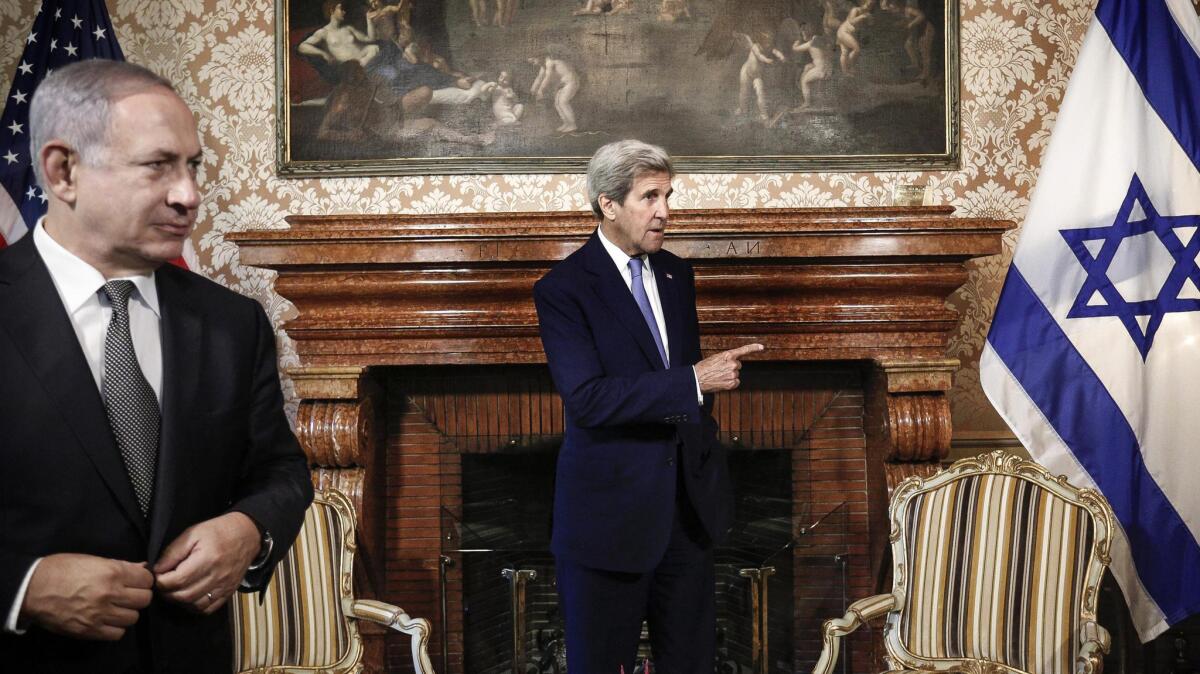After 6 years of estrangement, Israel and Turkey to normalize ties
- Share via
Reporting from Tel Aviv — Through years of Turkish-Israeli estrangement, little love seemed lost between leaders of the two countries.
Then-Turkish Prime Minister Recep Erdogan branded Israel a “terror state” and accused it of carrying out war crimes in the Gaza Strip. In equally caustic terms, Israeli Foreign Minister Avigdor Lieberman denounced the Turkish leader as an “anti-Semitic neighborhood bully.’’
On Monday, the two eastern Mediterranean powers sought to move past the emotionally charged dispute over Israel’s blockade of Gaza and Erdogan’s support for Hamas, as they unveiled a deal to normalize diplomatic relations. The pact arrives six years after nine Turkish activists were killed by Israeli naval forces on the deck of the Mavi Marmara, a boat that challenged Israel’s blockade of the Palestinian territory.
The detente could end diplomatic bickering and restore a degree of cooperation between two key U.S. allies in the region. For Erdogan, now Turkey’s president, and Israeli Prime Minister Benjamin Netanyahu the deal is aimed at erasing growing international isolation and, perhaps, opening the door to a strategically significant energy alliance between two countries, political experts say.
Indeed, within hours of the deal’s announcement, Turkey and Russia said they had also reached a reconciliation over Ankara’s downing of a Russian jet last year.
Holding simultaneous press conferences in Rome and Ankara, Turkish Prime Minister Binali Yildirim and Netanyahu said that restoring ties would benefit both countries while providing badly needed aid to the Gaza Strip. Still, the separate announcements and the lack of any mutual niceties served as a sign of the enduring tensions between Israel’s right wing administration and Ankara’s Islamist government – which seeks to reassert its leadership role in the Muslim world.

Netanyahu said he was seeking to “create centers of stability in the stormy Middle East…. Israel and Turkey are two major powers in the region and the break between us is not good for vital interests.” Still, he said the deal doesn’t represent a “honeymoon” between the countries.
The sides agreed to return their ambassadors and Israel agreed to pay $20 million in compensation to the families of the Mavi Marmara victims on condition that Turkey drop any charges against the soldiers who participated in the raid, Yildirim said.
Turkey, meanwhile, dropped a longstanding demand that Israel lift its blockade on the Gaza Strip and Israel agreed to let Turkey ship badly needed building materials for a new hospital and other building projects – part of a several-year reconstruction effort following the wars between Hamas and Israel.
Netanyahu said that the deal included a commitment from Turkey to prevent militant activities by Hamas on its soil, and to assist in efforts to return the remains of Israeli soldiers held in Gaza since the 2014 war.
The Turkish prime minister argued that Turkish aid shipments will mean the de facto lifting of Israel’s blockade on the Gaza, the impoverished coastal territory that is home to 1.8 million Palestinians. The agreement, he said, will give “breathing room” for Palestinians in the Gaza Strip, and demonstrate Ankara’s role as a “defender” of the Palestinians. He said that shipment of 10,000 tons of aid is supposed to depart Turkey later this week.
See the most-read stories in World News this hour >>
An official from the Western-backed Palestinian government in the West Bank criticized the pact, saying it leaves Israel’s blockade in place and treats Gaza as a separate political entity . “It’s not in the interest of Palestine,’’ said Hanan Ashrawi, a member of the executive committee of the Palestine Liberation Organization. “It’s in the interest of Turkey and Israel and maybe Hamas.”
Hamas expressed disappointment as well, saying the deal is “less than expected regarding lifting the siege on Gaza, but we have to thank Turkey for its efforts to ease the siege,” said Bassem Naim, a Hamas legislator.
U.S. Secretary of State John Kerry, who held a meeting with Netanyahu in Rome on Monday, said he was pleased with the steps toward reconciliation.
Since the outbreak of the Arab Spring in 2011, Erdogan’s ambitious “zero problems with neighbors” policy has slowly crumbled. Its border with Syria has been destabilized by the civil war, its relations with Egypt have deteriorated and the crackdown on the press and opposition activists have hurt its democratic credentials in Europe and the U.S.
Netanyahu, meanwhile, has faced rising criticism in Europe and the U.S. over the stalled peace process with the Palestinians and Israel’s continued expansion of Jewish settlements in East Jerusalem and the West Bank.
“Both leaders find themselves leading strong countries which are quite isolated…. That’s what pushing them into each other’s arms,’’ said Alon Liel, a former Israeli envoy to Turkey. “Still, it’s not all hugs and kisses. It will be difficult to reach a full recovery because there are a lot of scars and grievances, and its filtered down to the people.”
Correspondent Glen Johnson reported from Istanbul
MORE WORLD NEWS
European leaders scramble for a solution to ‘Brexit’ crisis
Heat wave aggravates chronic water problems in occupied West Bank
35 million dead in 35 years — and people are still dying from HIV/AIDS
More to Read
Sign up for Essential California
The most important California stories and recommendations in your inbox every morning.
You may occasionally receive promotional content from the Los Angeles Times.










